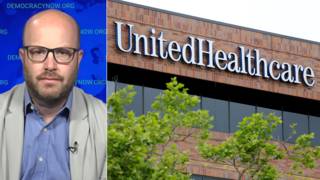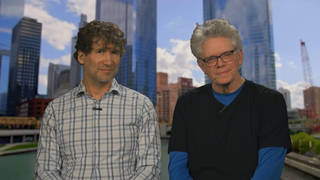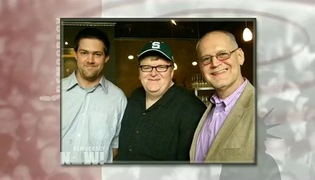
When Academy Award-winning film director Michael Moore announced he would be making a documentary about the American healthcare system in 2004, it put the health insurance industry on high alert. One person who immediately went on the offensive was Wendell Potter, who at the time was the chief spokesperson for insurance giant CIGNA. Last year, Potter became the industry’s most prominent whistleblower. We speak with him about his role in attacking Michael Moore, his film Sicko, and the movement for a single-payer healthcare system. “We felt that this movie would have such an impact that it would really pave the way for legislation to be passed that could be very detrimental to the insurance industry. So it was very important for the insurers to attack this movie as fiercely as possible,” Potter said. “We developed a very, very sophisticated communications campaign to make sure that people saw him [Moore] as a Marxist, as a socialist, and that he was going to be destroying the American Dream.” Wendell Potter is now the Senior Fellow on Health Care for the Center for Media and Democracy. He has a new book out, Deadly Spin: An Insurance Company Insider Speaks Out on How Corporate PR is Killing Health Care and Deceiving Americans. This is part of an extensive interview with Wendell Potter. Click here for Part 1.
AMY GOODMAN: We’re speaking with a chief whistleblower, former chief spokesperson for the health insurance industry, the insurance industry’s greatest nightmare. He was the spokesperson for CIGNA for years and, before that, Humana. And then, through a series of incidents, his own encounters with people without healthcare dying for lack of insurance, he stepped out. He quit. And he’s written the book Deadly Spin: An Insurance Company Insider Speaks Out on How Corporate PR is Killing Health Care and Deceiving Americans. Wendell Potter is our guest.
OK, this is Politico today, says, “Republican Andy Harris, a conservative Maryland physician elected to Congress on an anti-Obamacare platform, surprised fellow freshmen at a Monday orientation session by demanding to know why his government-subsidized health care plan takes a month to kick in.” A congressional staffer who saw the exchange said Harris “stood up and asked the two ladies who were answering questions why it had to take so long, what he would do without 28 days of health care.”
WENDELL POTTER: Isn’t that supremely ironic? And he had been campaigning against an incumbent, a Democrat, who was — and he was accusing him of being in favor of Obamacare. And he, this guy who was elected who you just spoke about, has pledged to repeal the legislation. Yeah, he is finally, I guess, for 28 days, possibly going to be in the same predicament that many Americans are in for months, if not years. And he was saying, essentially, “Where’s my government-run healthcare?”
AMY GOODMAN: OK. Let’s go to Sicko. Let’s go to the Academy Award-winning filmmaker Michael Moore’s film, Sicko.
PRESIDENT GEORGE W. BUSH: We got an issue in America: too many good docs are getting out of business; too many OB/GYNs aren’t able to practice their — their love with women all across this country.
NARRATOR: When Michael Moore decided to make a movie on the healthcare industry, top-level executives were on the defensive. What were they hiding?
SECURITY: That’s not on, right?
MICHAEL MOORE: No.
SECURITY: OK.
LEE EINER: The intent is to maximize profits.
MICHAEL MOORE: You denied more people healthcare, you got a bonus?
UNIDENTIFIED WOMAN: When you don’t spend money on somebody, it’s a savings to the company.
PRESIDENT RICHARD NIXON: I want America to have the finest healthcare in the world.
MICHAEL MOORE: Four healthcare lobbyists for every member of Congress. Here’s what it costs to buy these men and this woman, this guy, and this guy. And the United States slipped to 37 in healthcare around the world — just slightly ahead of Slovenia.
LINDA PEENO: I denied a man a necessary operation and thus caused his death. This secured my reputation, and it ensured my continued advancement in the healthcare field.
NARRATOR: In the world’s richest country…
MARY MORNIN: I work three jobs.
PRESIDENT GEORGE W. BUSH: You work three jobs?
MARY MORNIN: Yes.
PRESIDENT GEORGE W. BUSH: Uniquely American, isn’t it? I mean, that is fantastic.
NARRATOR: Laughter isn’t the best medicine.
LAURA BURNHAM: I get a bill from my insurance company telling me that the ambulance ride wasn’t pre-approved. I don’t know when I was supposed to pre-approve it. After I gained consciousness in the car? Before I got in the ambulance?
NARRATOR: It’s the only medicine.
MICHAEL MOORE: There was actually one place on American soil that had free universal healthcare.
Which way to Guantánamo Bay?
REP. DUNCAN HUNTER: Detainees representing a threat to our national security are given access to top-notch medical facilities.
MICHAEL MOORE: Permission to enter. I have three 9/11 rescue workers. They just want some medical attention, the same kind that the evil-doers are getting. Hello?
NARRATOR: Michael Moore’s Sicko.
AMY GOODMAN: Alright, there you have it, the trailer for Sicko. It comes out. What does CIGNA do? You were the spokesperson. Were you the spokesperson at the time?
WENDELL POTTER: I was, yeah.
AMY GOODMAN: You were.
WENDELL POTTER: Yeah.
AMY GOODMAN: So, how did you prepare for this?
WENDELL POTTER: Well, we were afraid, as the movie was being made, that Michael Moore would do ambush interviews, as he’s done in a lot of his movies in the past. So we lived in fear — I did, especially — that my CEO would be getting out of his limousine at some point, and there would be Michael Moore with a camera in his face. So, one of the things we had to do was to make sure that we media-trained our CEO and other executives so that they wouldn’t look like a deer caught in the headlights, if we could do that at all.
AMY GOODMAN: What did you tell your CEO? Wait, tell me his name again?
WENDELL POTTER: Ed Hanway.
AMY GOODMAN: What did you tell Ed?
WENDELL POTTER: Well, that — just be pleasant. Don’t run and hide. And just shake his hand and say, “Hi. I understand you’re the Hollywood moviemaker, and I’ve heard of you. I don’t have time to talk to you right now. So, if you’ll call Wendell Potter, I’m sure he can arrange for us to talk at some later time.”
AMY GOODMAN: Then it wouldn’t have just been the people of New York calling you, but people all over the country calling Wendell Potter.
WENDELL POTTER: Exactly, exactly. But I was willing to take the bullet, because I was, you know, paid for that.
AMY GOODMAN: And what were you going to say?
WENDELL POTTER: I would say, “Not a chance. You’re not going to talk — get anywhere close to the CEO.”
AMY GOODMAN: No, but what was your message on Sicko?
WENDELL POTTER: The message on Sicko was that this was Michael Moore’s vision for America, was to lead us into socialized medicine. We went back to those points again. We wanted to make sure that people were afraid of any other kind of system that would have more government regulation and in which people had universal care.
AMY GOODMAN: Did you work with other insurance companies in dealing with Michael Moore?
WENDELL POTTER: Oh, absolutely. Absolutely. We heard about Michael Moore starting this movie when he announced it, I think, in 2004. And as the movie was being made, we didn’t really know exactly how we would be portrayed in the movie. But when the movie premiered at the Cannes Film Festival in 2007, we, as the industry, the industry trade association, sent a staff member to the Riviera to go to the movie, to be among the first to see it, and then report back via conference call who was in the movie, how we were being portrayed. And we, from that moment on, developed a very, very sophisticated communications campaign.
AMY GOODMAN: Can you say what it was in five seconds, because we’re just about out of time?
WENDELL POTTER: To —
AMY GOODMAN: The strategy.
WENDELL POTTER: To make sure that people were — saw him as a Marxist, as a socialist, and that he was going to be destroying the American Dream.
AMY GOODMAN: Wendell Potter, are you for socialized medicine now?
WENDELL POTTER: I think that we need to have a system in which everyone is covered. If you call that socialism, so be it.
AMY GOODMAN: Wendell Potter, former executive, former chief spokesperson for CIGNA and Humana. His book is called Deadly Spin: An Insurance Company Insider Speaks Out….
I’d like to ask you, as we talk about the strategy, the sophisticated strategy that you developed for Sicko —- you’re dealing with your competitors now. They are more your friends, of course, than this film -—
WENDELL POTTER: Right, yeah.
AMY GOODMAN: — because it can go after you all. What, did you have meetings together?
WENDELL POTTER: Oh, we did.
AMY GOODMAN: In this conference call, sending this lucky staff member to the Riviera, and they call back. What did they say? Did they say the film was well received?
WENDELL POTTER: Oh, they did. They said, in fact, they — he reported that there was a 15-minute standing ovation at the end of the movie, so it was very, very well received. We were very scared. And we knew that we would have to develop a very sophisticated and expensive campaign to turn people away from the idea of universal care. We were afraid that this might really galvanize public opinion. We were told by our pollsters, in a meeting that was held just days after the premier of the movie, that for the first time ever since they had been polling, that people were —- a majority of people were in favor of much greater government involvement in our healthcare system. So that -—
AMY GOODMAN: Who were your pollsters?
WENDELL POTTER: McInturff, Public Opinion Strategies, Bill McInturff, who’s a well-known Republican strategist and who went on to be John McCain’s chief pollster. He’s been a pollster for the insurance industry for probably two decades. And he had been tracking public opinion for all these years. And this really scared the insurers, the executives. We were all concerned about that, because we felt that this movie would be — have such an impact that it would really pave the way for legislation to be passed that could be very detrimental to the insurance industry. So it was very important for the insurers to attack this movie as fiercely as possible.
AMY GOODMAN: And so, what was the grassroots strategy, if you had one, as the movie came out in the United States?
WENDELL POTTER: Well, one key component was to fund a front group, and that is something that I write about quite a bit in the book, about how special interests, and the insurance industry, in particular, will use premium dollars to funnel thousands and thousands, if not millions, of dollars to big PR firms to set up fake grassroots organizations — astroturf, as we call it — and front groups. And in this case, there was a front group that was set up called Health Care America, and the sole purpose for it to be set up was to attack Michael Moore and to attack the notion of a single-payer system in this country.
AMY GOODMAN: And who were the people who populated Health Care America?
WENDELL POTTER: There were just a couple of people. There was a woman. I think her name was —- I can’t remember her name. Sarah Berk, I think, was her name. But the media contact for it was a guy named Bill Pierce, who I had known and worked with in the past. He used to be a PR guy for Blue Cross/Blue Shield Association. At that time, he was in the public relations firm APCO Worldwide. He was listed as a media contact, and if you called his number, you would have reached him at his desk at APCO Worldwide. It didn’t have any substance. It was just a -—
AMY GOODMAN: What is APCO Worldwide?
WENDELL POTTER: It is a very, very big PR firm that was started several years ago by a big Washington law firm, Arnold & Porter. The A and P is Arnold & Porter, and they were defending —
AMY GOODMAN: APCO.
WENDELL POTTER: Yeah, and they were defending tobacco companies. So they felt that they needed to have help in the court of public opinion, as well as in the courtroom.
AMY GOODMAN: And what did Health Care America — who did they say they were?
WENDELL POTTER: They said they were representing consumers. And —
AMY GOODMAN: Did anyone expose this at the time?
WENDELL POTTER: No. No one did.
AMY GOODMAN: Did anyone have them on to counter what Michael Moore had to say on television, radio or quote them in the newspaper?
WENDELL POTTER: No. In fact — and I’ve done a search recently just to find out how they were covered, and they were never exposed.
AMY GOODMAN: But were they quoted?
WENDELL POTTER: Oh, absolutely. They were quoted extensively. They sent out press releases. And they were given status as a legitimate organization, even by the New York Times.
AMY GOODMAN: In what article?
WENDELL POTTER: There was an article that the New York Times wrote as a kind of a review of Sicko, not really a review but just a story about the movie actually premiering in the U.S. in June of 2007. And the New York Times story quoted the Health Care America spokesman as saying that this represented a move toward socialism. And there was not an — apparently not an attempt on the part of the reporter, or any reporter that I saw, to disclose the fact that this was funded largely by the insurance industry.
AMY GOODMAN: Let’s go to another clip of Sicko, of Michael Moore’s film, that they also feared, that they sent one lucky staff member, employee from CIGNA, to the Riviera to watch the film festival where Michael Moore got a standing ovation for 15 minutes, and then have a corporate conference call to report back on what they saw. This is Sicko, a clip.
MICHAEL MOORE: This guy broke his ankle. How much will this cost him? He’ll have some huge bill when he’s done, right?
NHS HOSPITAL ADMINISTRATIVE WORKER: Here, no. Just everything is free.
MICHAEL MOORE: I’m asking about hospital charges, and you’re laughing.
Even with insurance, there’s bound to be a bill somewhere.
What did they charge you for that baby?
NEW FATHER: No, no, no. Everything was on NHS.
NEW MOTHER: This is NHS.
NEW FATHER: It’s not America.
MICHAEL MOORE: So this is where people come to pay their bill when they’re done staying in the hospital.
NHS CASHIER: No, this is the NHS hospital, so you don’t pay that bill.
MICHAEL MOORE: Why does it say “cashier” here if people don’t have to pay a bill?
NHS HOSPITAL ADMINISTRATIVE WORKER: …place, you have — it just means get the traffic expenses reimbursed.
MICHAEL MOORE: So in British hospitals, instead of money going into the cashier’s window, money comes out.
[from Democracy Now!, mooreon”>6/18/07]
MICHAEL MOORE: Yeah, they look at me like I’m from Mars when I’m asking the Brits, you know, how much they paid for this, that or whatever.
AMY GOODMAN: We’re talking to Michael Moore. Let’s talk about how we arrived at the system we did in this country.
MICHAEL MOORE: Well, you know, my grandfather was a country doctor, actually. He was from Canada. He went to medical school in the late 1800s, which was a year then. You know, it’s pretty much what they knew back then. They could teach it in a year. And so, the little village where, you know, I was raised, because my mom was from there, too, because he was there, you know, he was paid with eggs and milk and chickens and things like that. He didn’t do it to make any big money. They didn’t make big money then. They were comfortable — the local doctor — but they weren’t the rich man in the community.
We got away from the concept of treating people because it was the right thing to do. The nuns ran the hospital that I was born in. The nuns weren’t doing this to turn profit and invest in Wall Street. You know, I mean, they did it because they thought that was their duty to serve God and to serve mankind by opening hospitals and delivering babies. We’re a long ways from that now. Somewhere we let profit and greed enter into this.
And in the film, I peg a certain date when the HMOs really got their start. And I got very lucky. I had a 23-year-old researcher in my office who worked on the film, who was actually someone I believe that was recommended by Jeremy Scahill, so there’s a Democracy Now! connection to this moment in the movie. But he found this Watergate tape — has nothing to do with Watergate, it’s one of the Nixon tapes — at the Archives, National Archives, where Nixon and Ehrlichman are discussing whether or not to support this HMO concept. And Ehrlichman says to Nixon, “You’re going to love this, because this is private enterprise. This isn’t like some freebie thing.” Nixon goes, “Oh, I like that. Tell me about it.” And then Ehrlichman says, “Well, this is how it’s going to work, these HMOs. They’re going to make more money by providing less care. The less care they give them, the patients, the more money the company makes.” Nixon goes, “Ooh, not bad!” And it’s all there on tape.
AMY GOODMAN: Wendell, you were laughing as Michael’s describing the Ehrlichman tape, the Nixon-Ehrlichman-Haldeman. You know this tape.
WENDELL POTTER: I do know that tape, and it was, I think, a great find —
AMY GOODMAN: Did anyone ever tell you you look a little like John Haldeman?
WENDELL POTTER: Thank you, maybe. I don’t know. But it was important for that conversation — important was really — that conversation was very important because, at that time, Ted Kennedy was trying to get legislation enacted that would have been a Medicare-for-all system, in which we would have had a single-payer system in this country. So Nixon was desperate to find some private enterprise solution that could be used a counter to what Ted Kennedy was trying to do at that time. It’s very important.
AMY GOODMAN: I want to go back to Health Care America. This is really important, what you’ve just been describing, this astroturf organization that’s quoted by the New York Times and other publications and media as a consumer healthcare group, that isn’t, that’s sitting in APCO, made by Arnold & Porter, who represented the tobacco companies. And they’re there to kill any idea of public option or anything like that. What other organizations are there? And how successful did you think you were in dealing with Sicko? Did you think you contained the message?
WENDELL POTTER: There’s no doubt we felt we were successful in blunting the impact of the movie. We were concerned that the movie would be as successful as Fahrenheit 9/11 had been. And we knew that if it were, it really would change public opinion about our healthcare system in ways that would be harmful to the profits of health insurers. So, it was very important for this campaign to succeed. At one point during a strategy meeting, one of the people from APCO said that if our efforts, our initial efforts, were not successful, then we’d have to move to an element of the campaign to push Michael Moore off a cliff. And not meaning to do that literally, but to —
AMY GOODMAN: Are you sure?
WENDELL POTTER: Well, I’m not sure. To tell you the truth, when I started doing what I’m doing, I was concerned about my own health and well-being, maybe just from paranoia. But these companies play to win. And we’re talking about some big bucks at stake here — billions and billions and billions of dollars.
AMY GOODMAN: So what were they talking about when they said, “If this doesn’t work, we’re going to push him off the cliff”?
WENDELL POTTER: Well, it would be just an incredibly intense PR effort, if necessary, to spend more premium dollars to defame Michael Moore, to discredit him even more as a filmmaker.
AMY GOODMAN: So, were you doing research on him?
WENDELL POTTER: Oh, yeah. Oh, yeah.
AMY GOODMAN: You were going — personally?
WENDELL POTTER: Well, I was a part of the effort. I didn’t — that was part of the reason for hiring APCO and to work with a trade association, is that relieved me the responsibility of doing that kind of work. You paid for it to be done by people who were experts in doing that kind of research.
AMY GOODMAN: But they were doing an investigation into him personally?
WENDELL POTTER: Well, absolutely. We knew as much about him probably as he knows about himself.
AMY GOODMAN: About his wife, about his kid, about —
WENDELL POTTER: Oh, yeah. You know, it’s important to know everything that you might be able to use in some kind of a campaign against someone, to discredit them professionally and often personally.
AMY GOODMAN: And did you use that?
WENDELL POTTER: You use it if necessary.
AMY GOODMAN: Did you use it?
WENDELL POTTER: It was not — we didn’t deem it necessary to push him off a cliff, because we were very mindful of the box office totals. We looked at that every weekend to see how well it was doing, and we could see that it was not getting or drawing the audiences like Fahrenheit 9/11 did. And we thought that the efforts of Health Care America and our allies were succeeding.
AMY GOODMAN: When the film came out and you did the research, did you feel that you actually had contained it at the beginning? I think of a CNN critique that Sanjay Gupta did, Sanjay Gupta did.
WENDELL POTTER: Right.
AMY GOODMAN: Did you have anything to do with that?
WENDELL POTTER: I didn’t. Again, some of the reason you hire these big PR firms is you can do this with a little bit of a hands-off kind of operation. The big PR firms have very good connections with producers of network shows and cable shows and columnists and pundits. And so, you rely on them to be able to get your messaging out. And they’re very, very successful in influencing people about how they write or how they put a show together.
AMY GOODMAN: I mean, he was furious. Michael Moore went on CNN, was outraged, and said that everything they said about him wasn’t true. And in the end, CNN had to apologize.
WENDELL POTTER: Yeah.
AMY GOODMAN: They were not correct, what they said about Michael Moore’s film, that he had gotten his facts wrong.
WENDELL POTTER: I think CNN and Sanjay Gupta undoubtedly were embarrassed that they had been, frankly, duped by the insurance industry, probably not even aware of the role that the insurance industry was playing in that.
AMY GOODMAN: Did the insurance industry put out to all the networks — you had your chosen producers at all the networks — fact sheets on Sicko?
WENDELL POTTER: Not directly. Again, that’s why you hire these third parties, these PR firms, to do it for you, so that your involvement cannot be traced.












Media Options